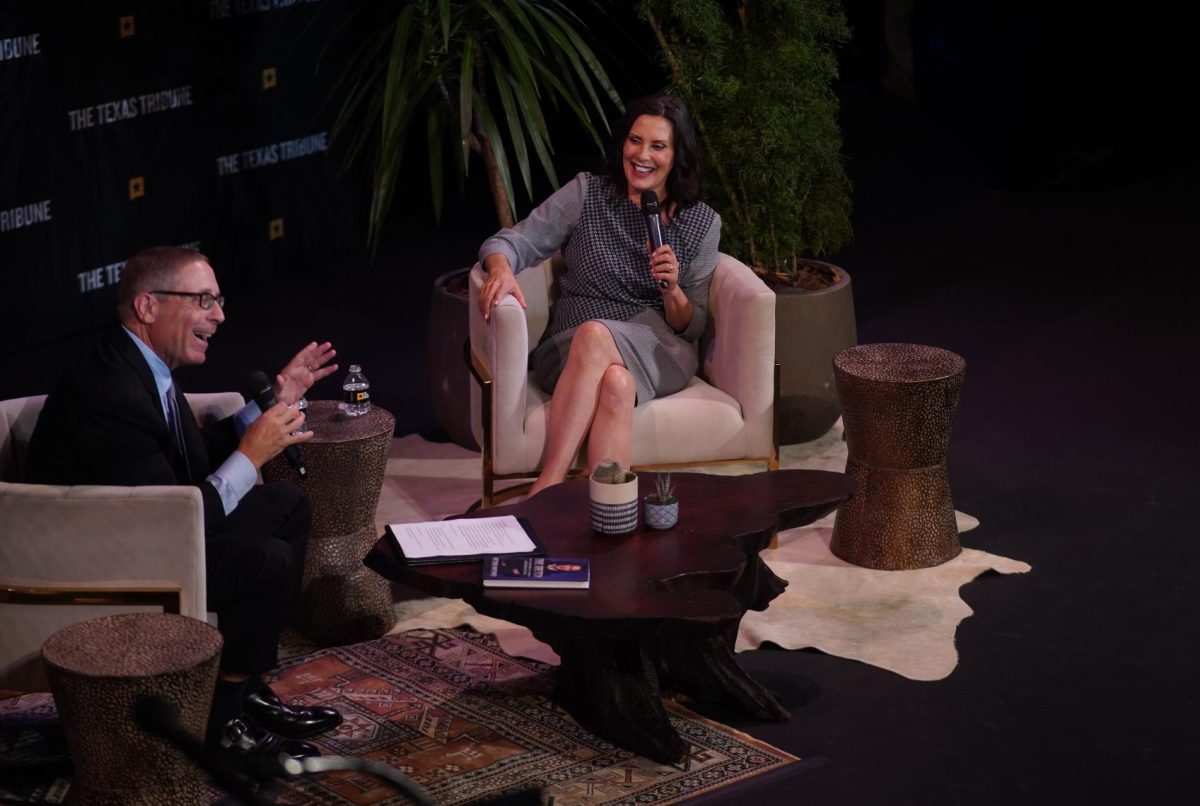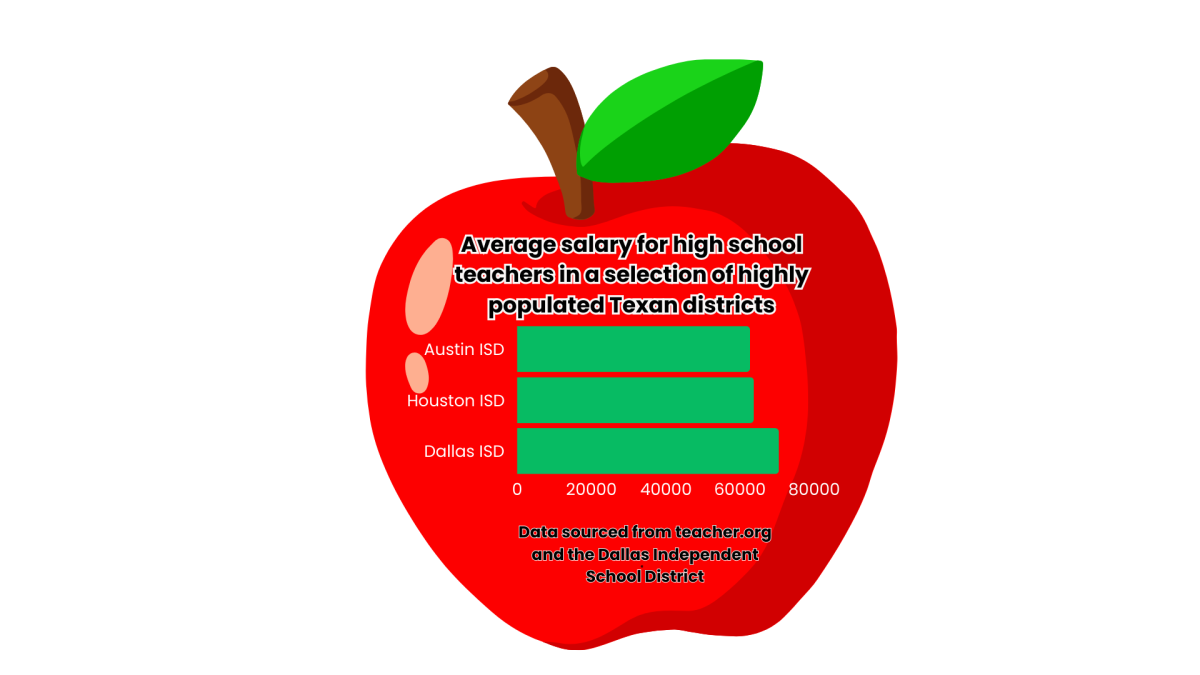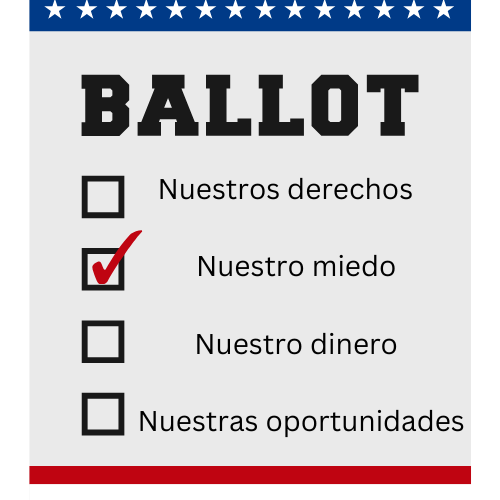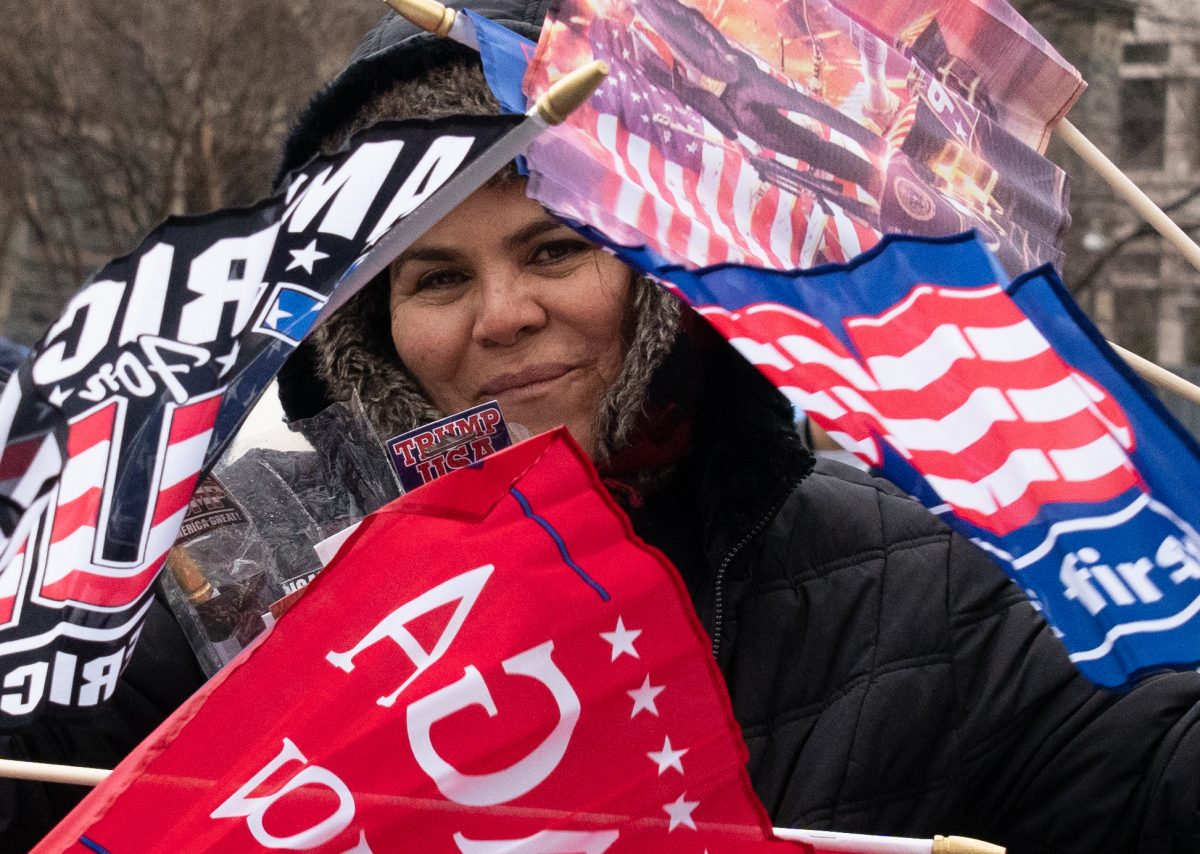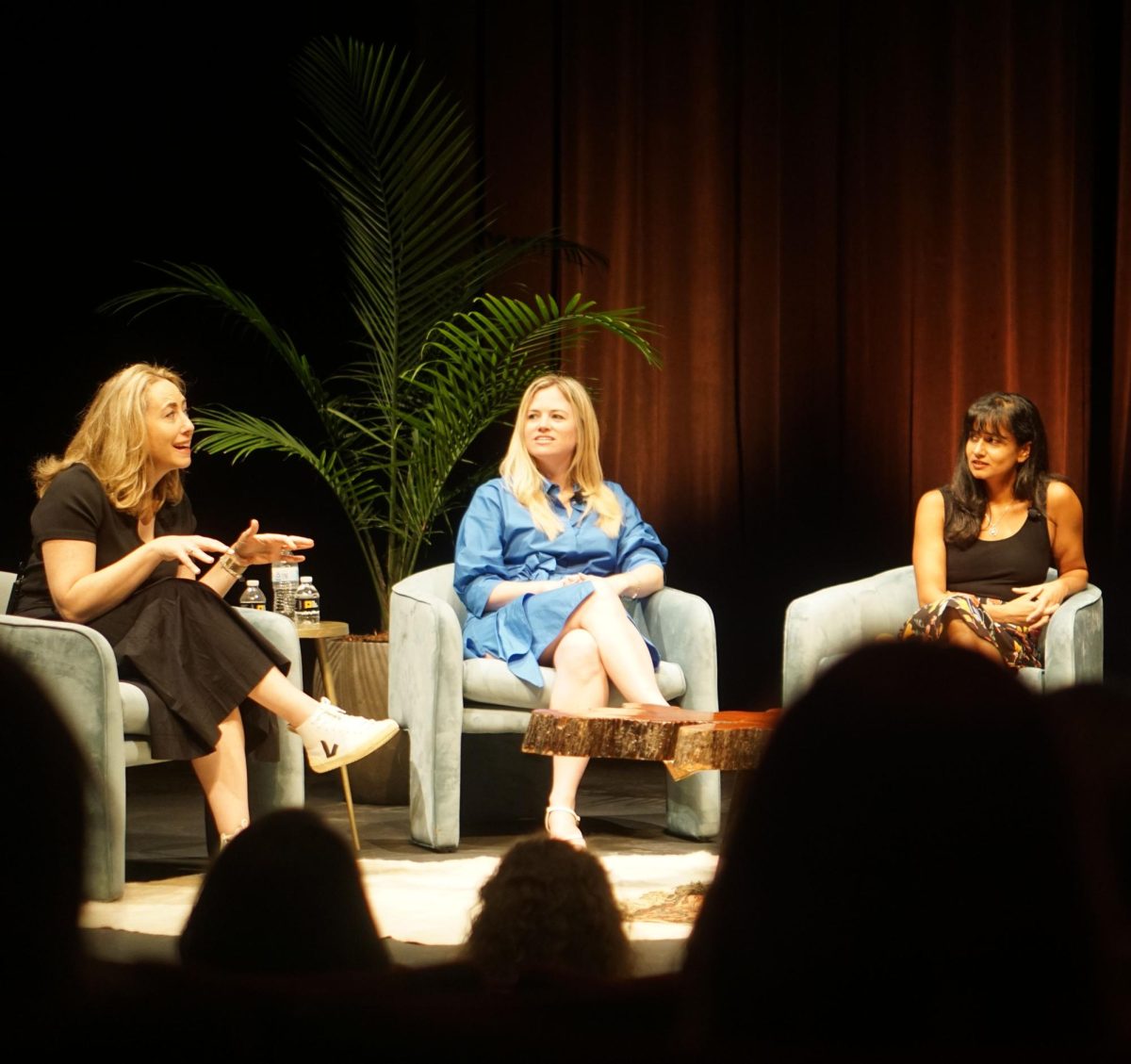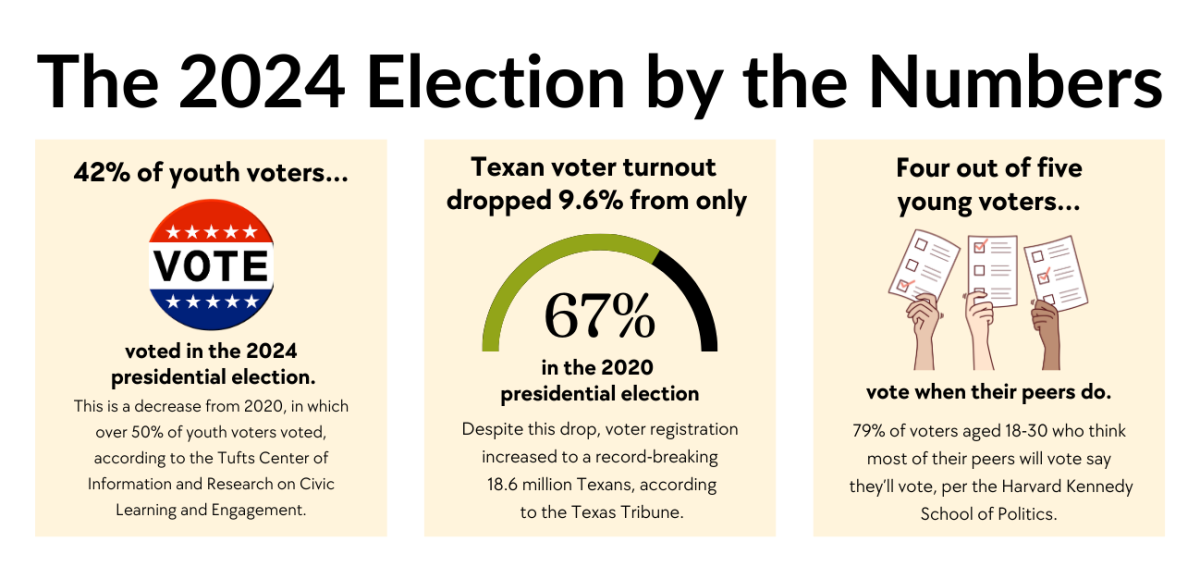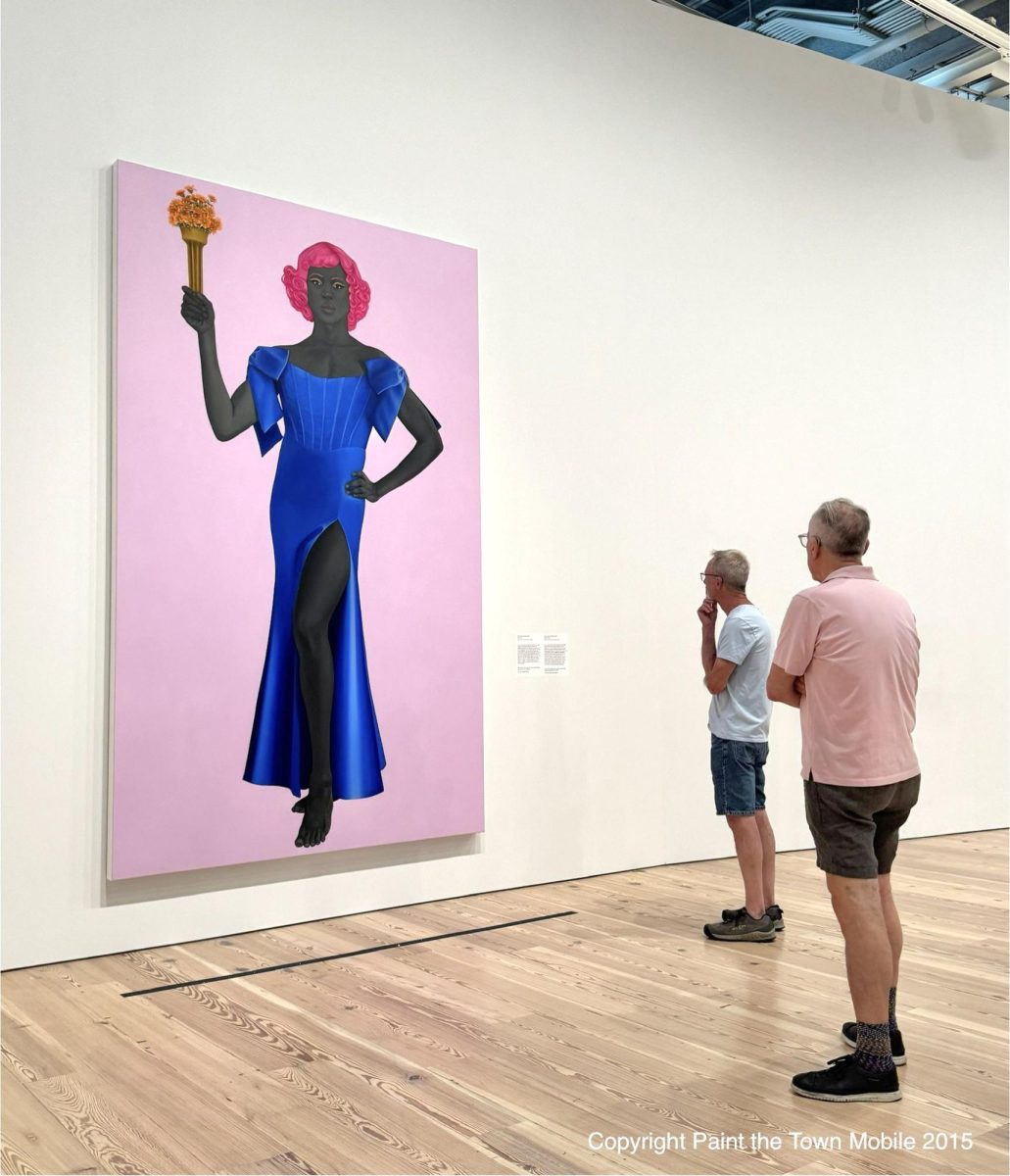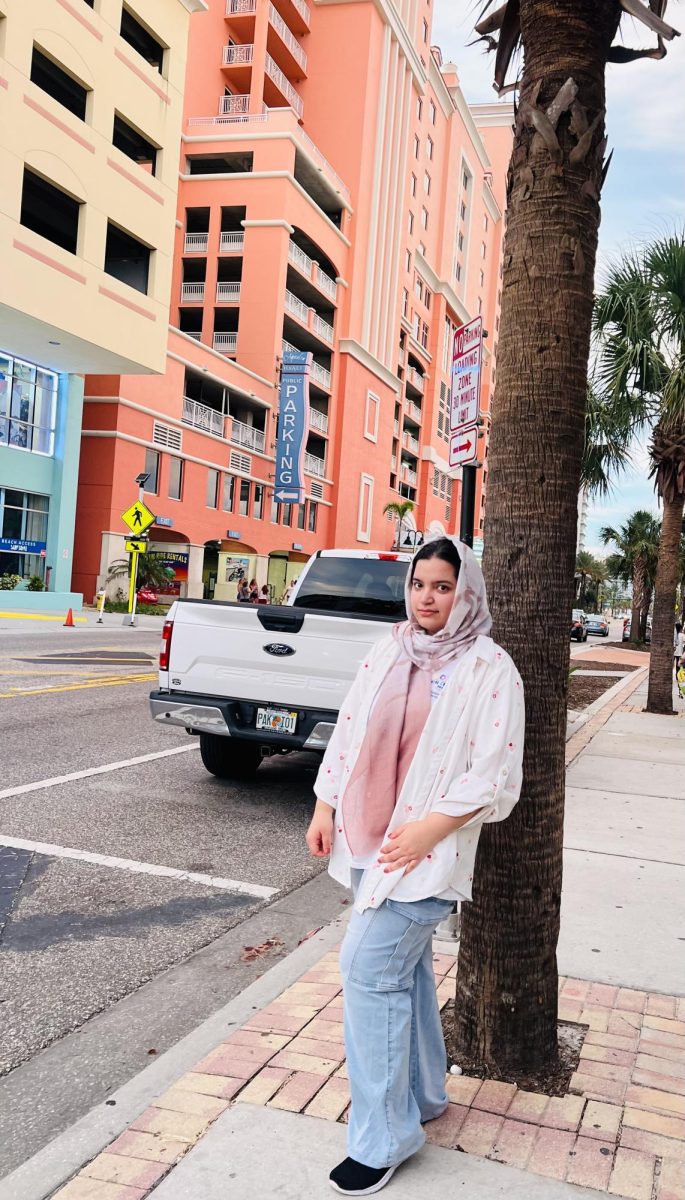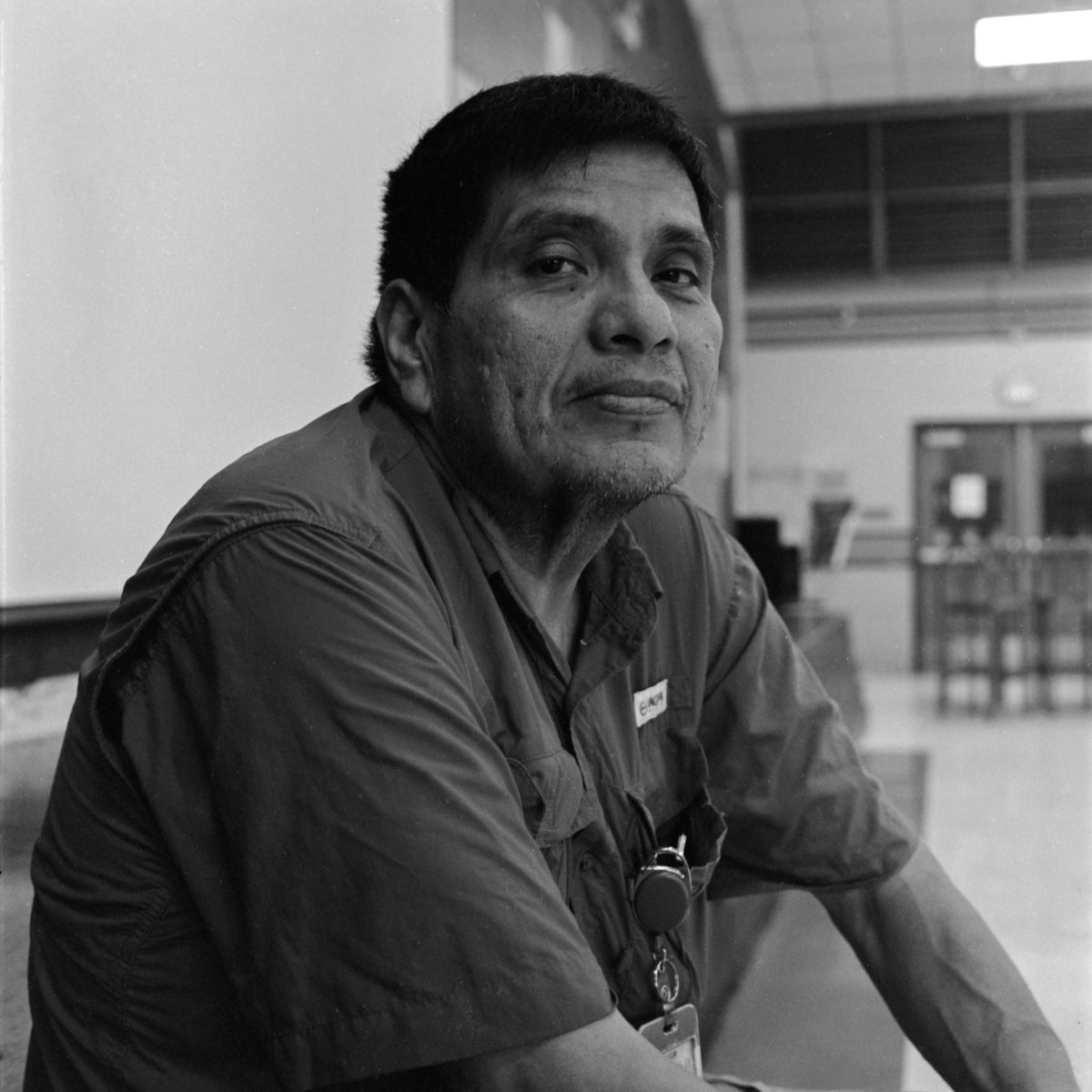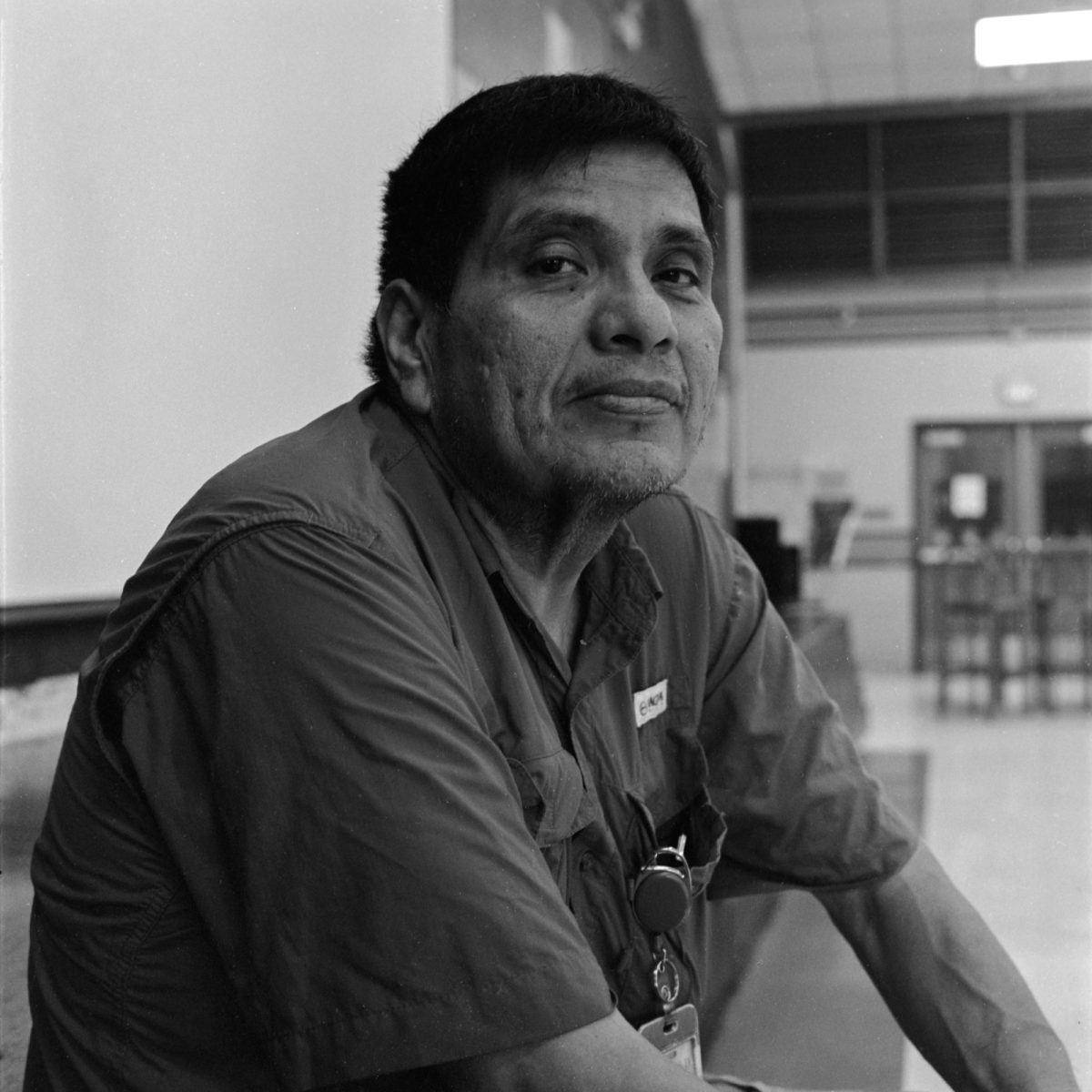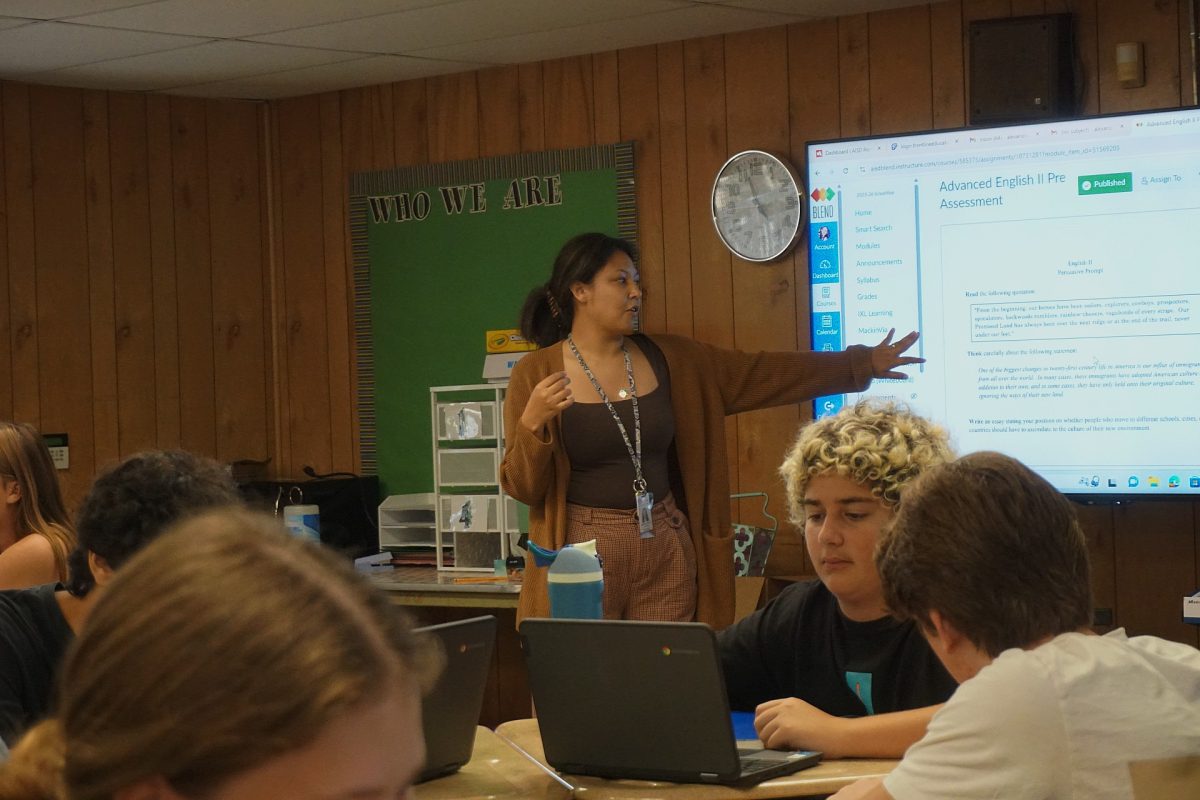The 14th annual Texas Tribune Festival dominated much of downtown Austin on Sept. 5-7. With thousands in attendance, and more than 300 speakers, the three-day festival packed in over a hundred sessions and events. After a busy first day on Thursday, Michigan Gov. Gretchen Whitmer, packed Paramount Theater for the opening keynote. Throughout the days, events started as early as 8 a.m. and did not end until around 8 that night. Many notable speakers included, former Speaker of The House Nancy Pelosi, former U.S. Rep. Liz Cheney, former Texas Gov. Rick Perry, Maryland Gov. Wes Moore, former White House press secretary Jen Psaki, U.S Rep. and Democratic Senate candidate Colin Allred, voting rights activist Stacey Abrams and many more.
The variety of sessions and speakers grew each day. Many Austin and Texas representatives attended like U.S. representatives from Austin, Lloyd Doggett. Greg Casar and Michael McCaul. Other Austin representatives included Texas State Representative Donna Howard and James Talarico. The festival covered a range of topics, from conversation about the upcoming election, to affordable healthcare, to the experience of first ladies in the United States. There seemed to be something for everyone.
On Saturday, the festival shut down sections of Congress Avenue to allow the public to listen to speakers without a pass and attend different booths lining the street. That evening, the three-day event wrapped up with a closing keynote by Virginia Gov. Glenn Youngkin. After Youngkin’s session, the 2024 Texas Tribune Festival came to an end after the three days of events. All photos and captions by Lillian Gray.
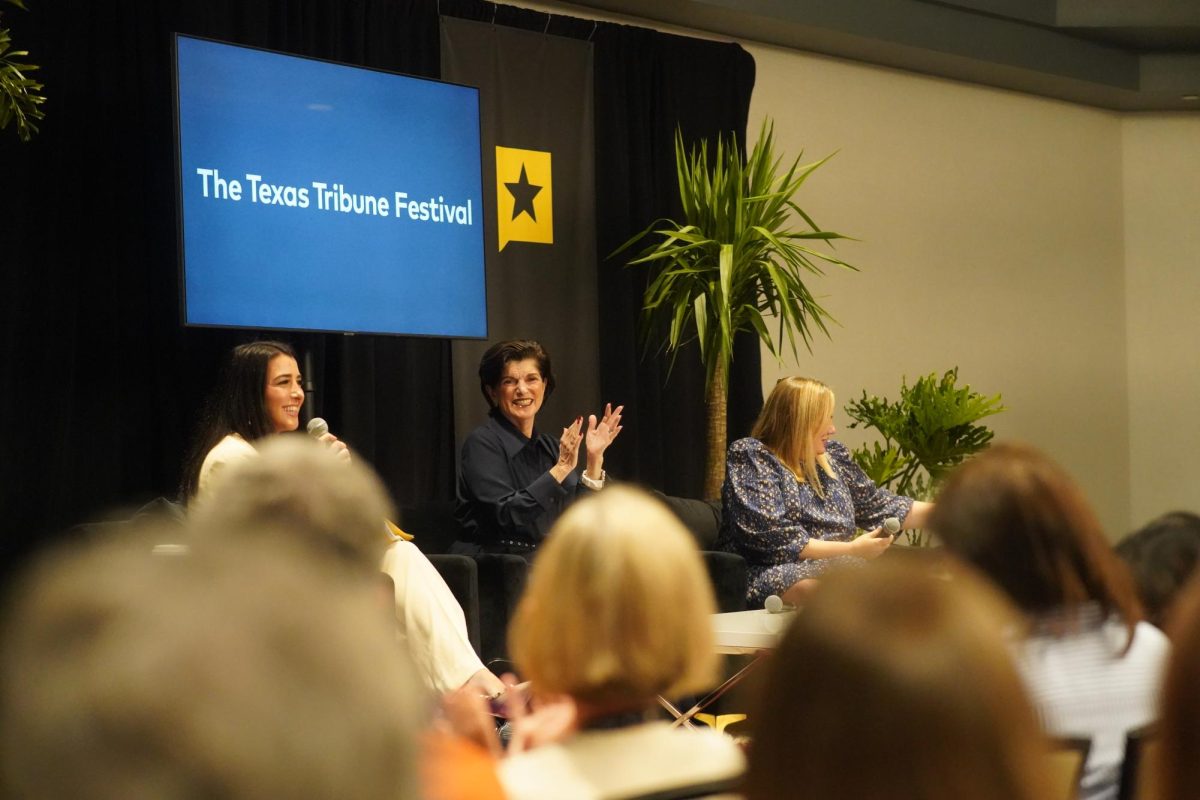
LUCI BAINES JOHNSON: One of the first events at the Texas Tribune Festival packed the room on Thursday as Luci Baines Johnson took to the stage. Johnson, the daughter of the 36th U.S. president, Lyndon B. Johnson, spoke alongside Katie Rogers, a New York Times White House correspondent, in a session moderated by Elaina Plott Calabro, a staff writer for the Atlantic.
For most of the session, the panelists discussed Rogers’ newly released book American Women, which delves into the “transformation of the modern first lady from Hillary Clinton to Jill Biden.” As the daughter of first lady, Lady Bird Johnson, Johnson was able to give firsthand accounts and insight into her mother’s service as first lady.
“The world being a better place is what I think most first ladies have wanted to make their contribution towards,” she said. “Having the world be a better place and taking a role that would make it so. But Lady Bird Johnson, she took it a step forward. First, you know, she was a journalist and a historian by academic training and can you imagine two credentials that would be more ideal than to be the wife of Lyndon Johnson?”
The three panelists continued to discuss the lives of first ladies and family dynamics in the White House. The conversation shifted at times to allow Johnson to speak about her father and to correct misperceptions about his life and presidency. In 1968, President Johnson stepped aside from running for a second term, Johnson made a point to the crowd that her father did not step down for political reasons like the Vietnam War, but rather for the sake of the nation’s well being, a sacrifice that he knew he had to make.
“I believe and I always will believe that my father, like President Biden, loved that job and opportunity to serve with all his heart and all his soul and all his might, but he loved his country more,” she said. “My father convinced me and my sister that the greatest joy in life is in the giving not the getting and the greatest opportunities come in service. So as long as I live, I will be working for causes that were important to him. Social justice, education, health care, those are where my life’s energies have gone, and that’s where all the fun is.”
Johnson spoke on the importance of being the daughter of a president, but also the importance of staying true to herself and not allowing the public life she grew into to shut her down. She shared many of the lessons learned from her father and mother, and how she hopes to continue to carry on their legacy.
“I’m not gonna let it consume me,” she said. “I’m not gonna let it define me. I’m gonna always enjoy having the chance to learn like my father asked me to. Listen. Learn about new people every day. Be able to grow from that experience. And never ever stop enjoying the privilege of learning.”
A love of learning was a theme stressed throughout the session. At the beginning of the session, Johnson said, “Your judgment is only as good as your information.” As she finished her remarks, she reiterated that idea once more.
“My mother, two weeks before she died, had me wheeling her through the Blanton Art Museum,” she said.” She said her parents taught her that “a day without learning is a day that is wasted.” As the session ended, she thanked her audience for coming to the session: “Bless you all for wanting to learn more of the truth.”
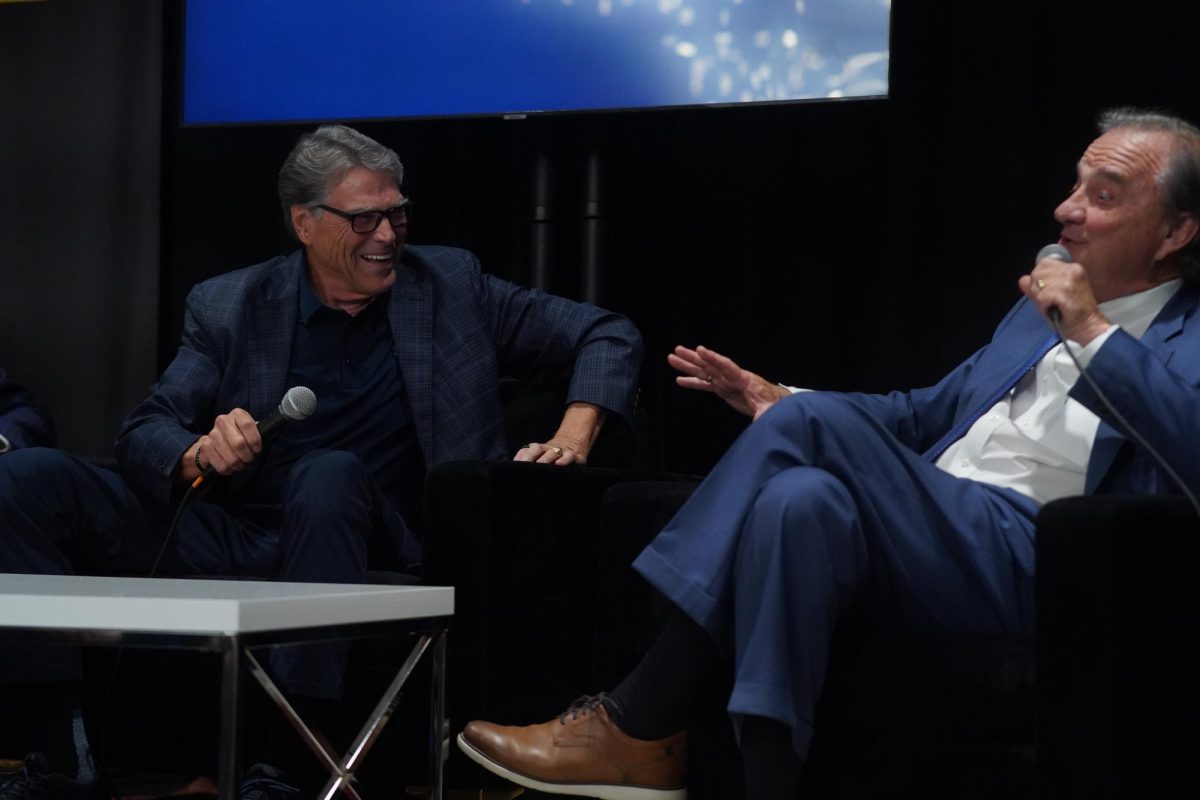
RICK PERRY: Former Texas Gov. Rick Perry and Texas A&M Chancellor John Sharp shared a session Thursday morning. The two have a shared history, which fueled a conversation that moved away from politics and policy and centered on two old friends reminiscing on their bumpy path. In the back and forth, Perry talked a lot about the “bad blood” the two have had at times and how they overcame it.
“Sharp and I literally could ruin each other’s political career on any given day, which we’ve both tried to do,” he said. “Sharp said the worst political decision he ever made in his life was calling me in 1983 and saying, ‘Hey Perry, would you consider running for the Texas legislature?’”
Perry talked about the ups and downs of their friendship, one that has come to a sense of mutual respect.
“We had ample times that we could’ve told each other to go butt a stump and we have from time to time,” he said. “Finding the ways to work together, finding the ways to put your petty differences behind you and do what’s right for the people of the state of Texas is what you’re gonna be remembered for. And I will suggest that John Sharp and Rick Perry will be remembered for a lot of good things that we did in the state of Texas.”
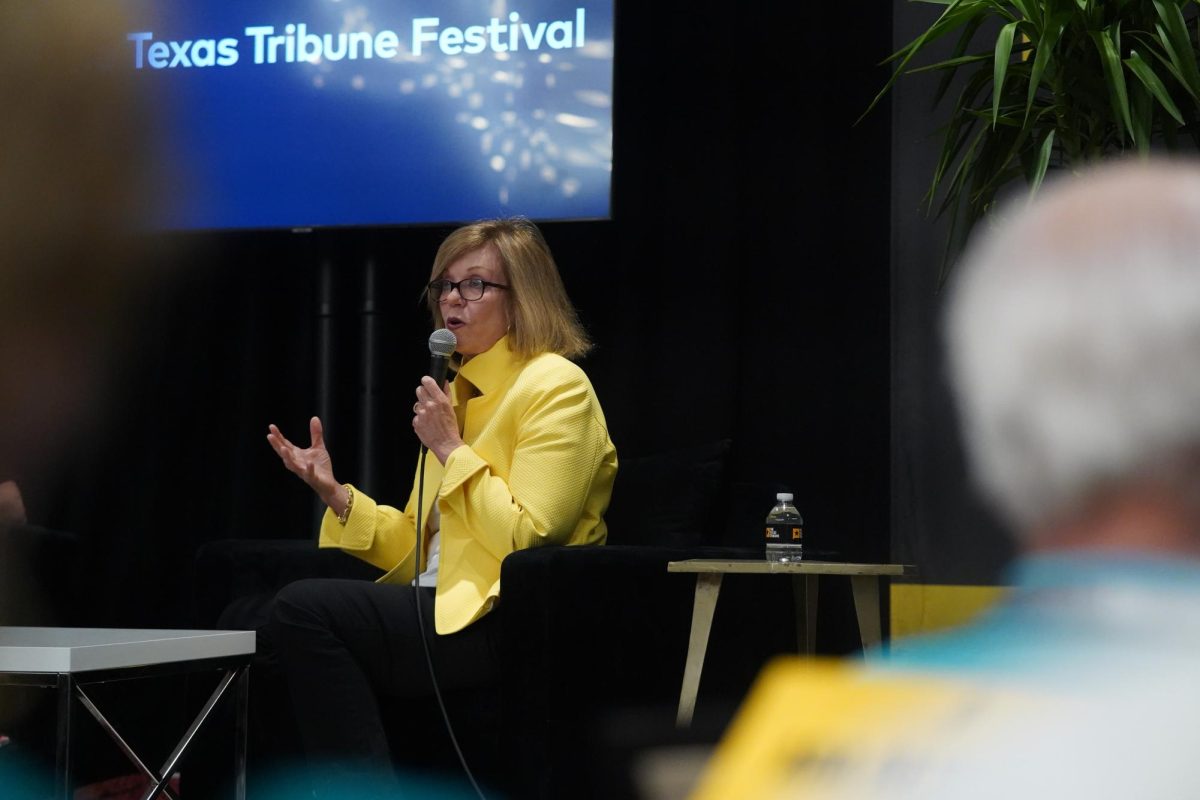
SUSAN PAGE: The Texas Tribune Festival drew in many speakers who used their time to discuss topics covered in their recently published books, among them Susan Page, Washington bureau chief at USA Today. During a discussion with Emily Ramshaw, co-founder and CEO of the 19th, Page spoke about her new book, The Rule Breaker. The book is a biography about broadcast journalist Barbara Walters, in which Page digs deep into Walter’s life with information acquired through countless interviews and additional research. During the session, Page focused on discussing the time period in which Walters lived and the different social challenges she had to overcome as a result.
“It’s not that sexism has gone away, but man it’s mild today compared to then,” she said. “She had been the first woman co-anchor of a morning show, The Today Show, where she was on with a guy called Frank McGee, who was a very serious journalist who did not think much of her: he found her quite annoying. He went to the head of NBC news and had them set an explicit rule that when they were doing interviews for The Today Show she could not speak until he had asked the first three questions.”
Although Walters had been faced with serious sexism and bias, Page explained to the crowd that this didn’t make her empathetic for other women facing the same challenges; it just forced her to be independent and focused on her personal goals.
“You know, the sisterhood is a powerful thing, but not for Barbara Walters,” she said. “This was a day when if you were lucky, there would be one job for women, there would not be two jobs for women. If another woman got the job you wanted, that job was then gone. So she saw women not as potential allies, who would understand what she was going through; she saw other women journalists as competitors and rivals who would cost her the success that she wanted so much.”
This laser focus on career success, Page shared, led to Walters being very isolated especially in the end of her life. Throughout her life, Walters chose work over family and when she could no longer work, she lived alone in her final years with just paid caretakers to look after her. Even worse, she felt shame that she was no longer the center of attention. This withdrawal from public life made it difficult for Page to get the final information she needed for the book. The biggest challenge, finding the grave of Walters, Page said, was incredibly difficult but worth it.
“I tell you this story because of the inscription on her headstone,” she said. “These were plaques to the ground, which is why we had so much trouble finding them, and it was like her father was ‘beloved husband,’ her mother was ‘beloved wife,’ and Barbara’s doesn’t say that: hers says ‘Barbara Walters, no regrets, I had a great life.’”
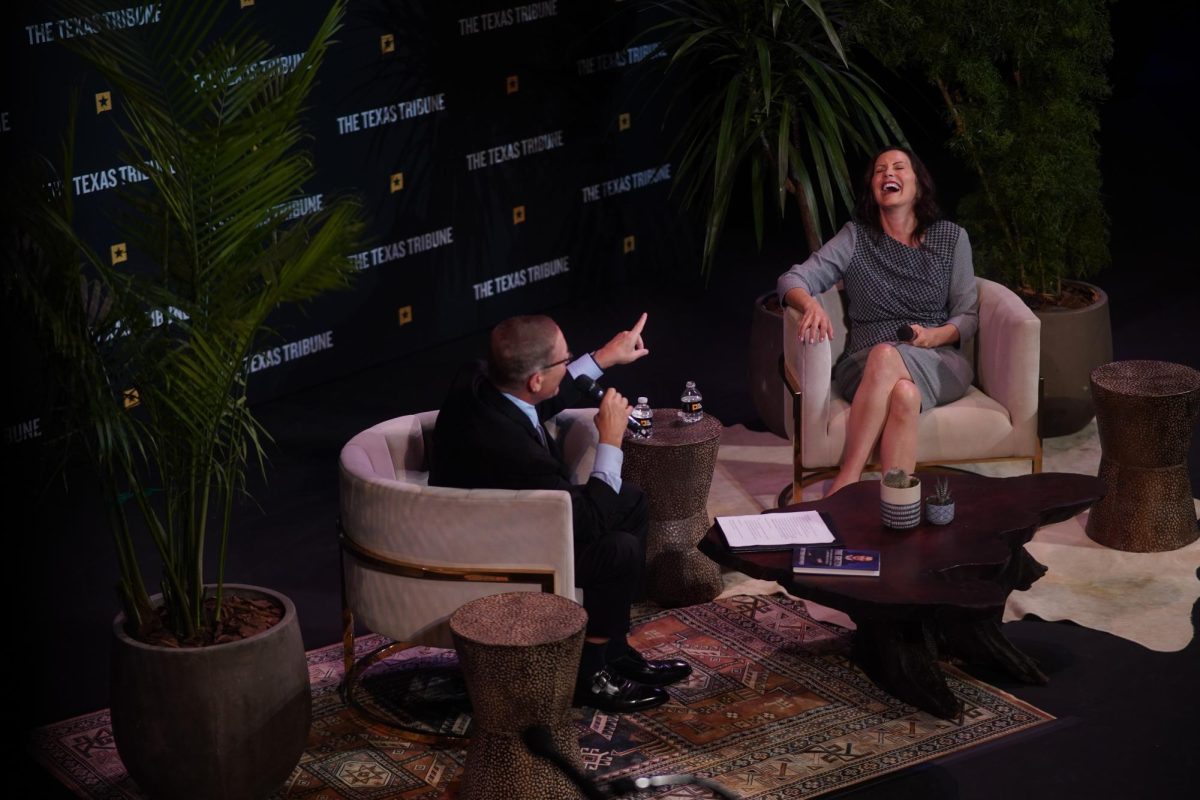
GRETCHEN WHITMER: At Thursday night’s opening keynote, Michigan Gov. Gretchen Whitmer and Texas Tribune co-founder Evan Smith kicked off the Texas Tribune Festival with a discussion about Whitmer’s new memoir and her time as governor. Whitmer, the second woman to become governor in Michigan, has held office since 2019 and talked about her experience running for that position and the progress she has made during her time in that position.
“In Michigan we got on the right side of civil rights for the LGBTQ+ community,” she said. “We were able to get the Crown Act signed into law and feed all 1.4 million Michigan public school students breakfast and lunch every single day. We were able to get background checks and red flag laws and secure storages. We have been delivering on the agenda on which we ran, always mindful though, that it’s a one-seat majority. So where we can find bipartisan support we strive always to do that. Because in order to sustain this work we’ve got to make sure that this is what’s good not just for the Michigan economy but for all of the people that call Michigan home.”
As Whitmer covered much of her accomplishments, she talked about her experience running for governor. She described challenges she faced but also advice she got from others like one piece of advice said to her prior to one of her debates for governor that still sticks with her today
“The happy warrior always wins the debate,” she said. “If you can turn off the volume and just watch and see who looks like they’re having the most fun, they’re almost always the one who wins the debate, so try to remember to be a happy warrior.”
With a range of different topics covered in the opening keynote, a large portion was about Whitmer’s governor race and her experience in politics. Along with that though, the conversation pivoted toward the end to cover the upcoming presidential election and what Whitmer hopes to see from Harris.
“Let Kamala be Kamala,” she said. “I think so many politicians get all tied up in knots because they’re trying to be this for that audience and this for that audience, and they lose themselves. I think just showing up just as she is is incredibly powerful.”
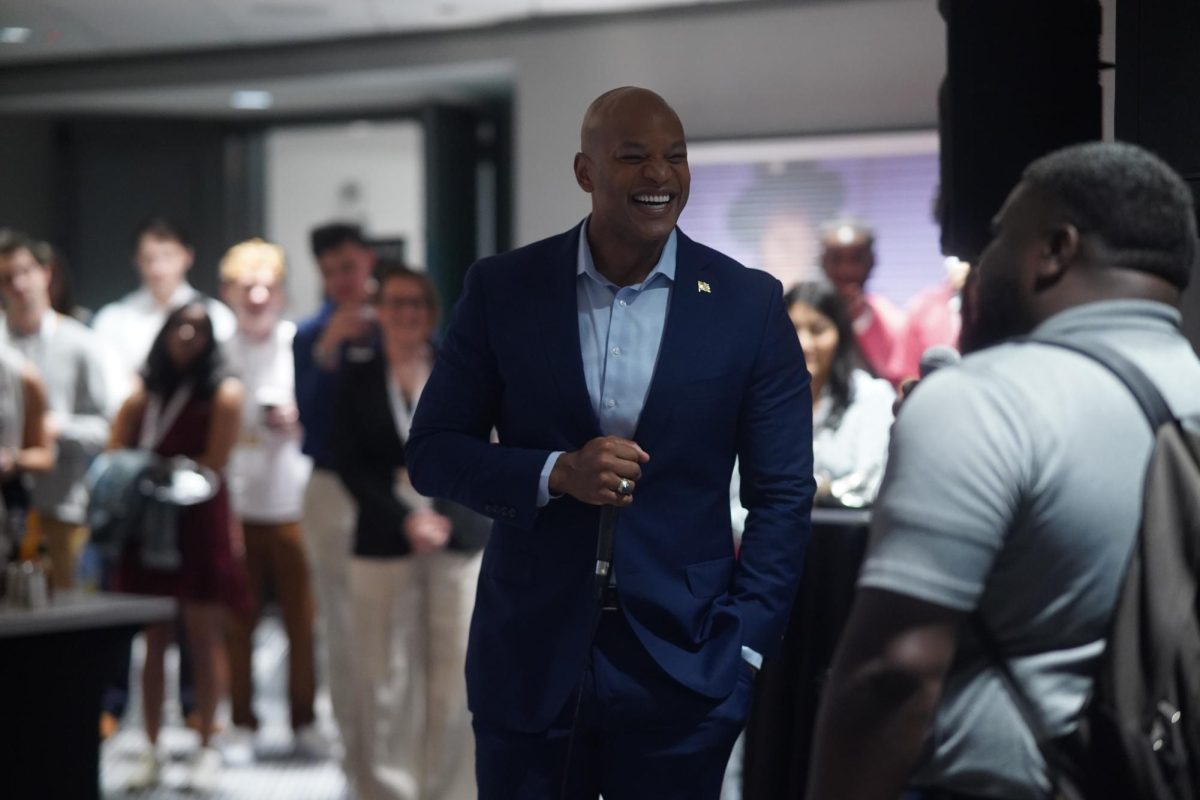
WES MOORE STUDENT BREAKFAST: Early Friday morning, students at the Texas Tribune Festival had the chance to hear Maryland Gov. Wes Moore speak at a student breakfast held in the Omni Hotel. As students gathered around Moore, they heard him speak about a variety of different issues. For one, Moore touched on education and the importance of understanding American history as a whole and not trying to cover any of it up.
“Loving your country does not mean lying about it,” he said. “We still stand here today in this moment with an opportunity to continue to build a more perfect union. That is the greatest love story of America that I could ever understand.”
Moore took a moment to tell his experience during the events on March 26, 2024 when a container ship hit the Francis Scott Key Bridge on the Patapsco River in Maryland, causing it to collapse, killing six construction workers.
“I learned at 2:02 in the morning that we were hours away from realizing that that bridge that nearly 40,000 people took to get to work every day, was gone,” he said. “We were hours away from thousands of workers realizing that the port of Baltimore that they relied on, that represents 13% of our state’s economy, was shut down.”
With a difficult and tragic situation at hand, Moore explained the goals he hoped to accomplish following the incident and how he achieved them.
“We were gonna make sure that we could support the workers who woke up that morning and now realized they didn’t have a job,” he said. “We were gonna make sure that we got the port of Baltimore reopened as soon as possible. And we were gonna make sure we rebuilt the Francis Scott Key Bridge. People said it would take 11 months to reopen the port of Baltimore and it took 11 weeks.”
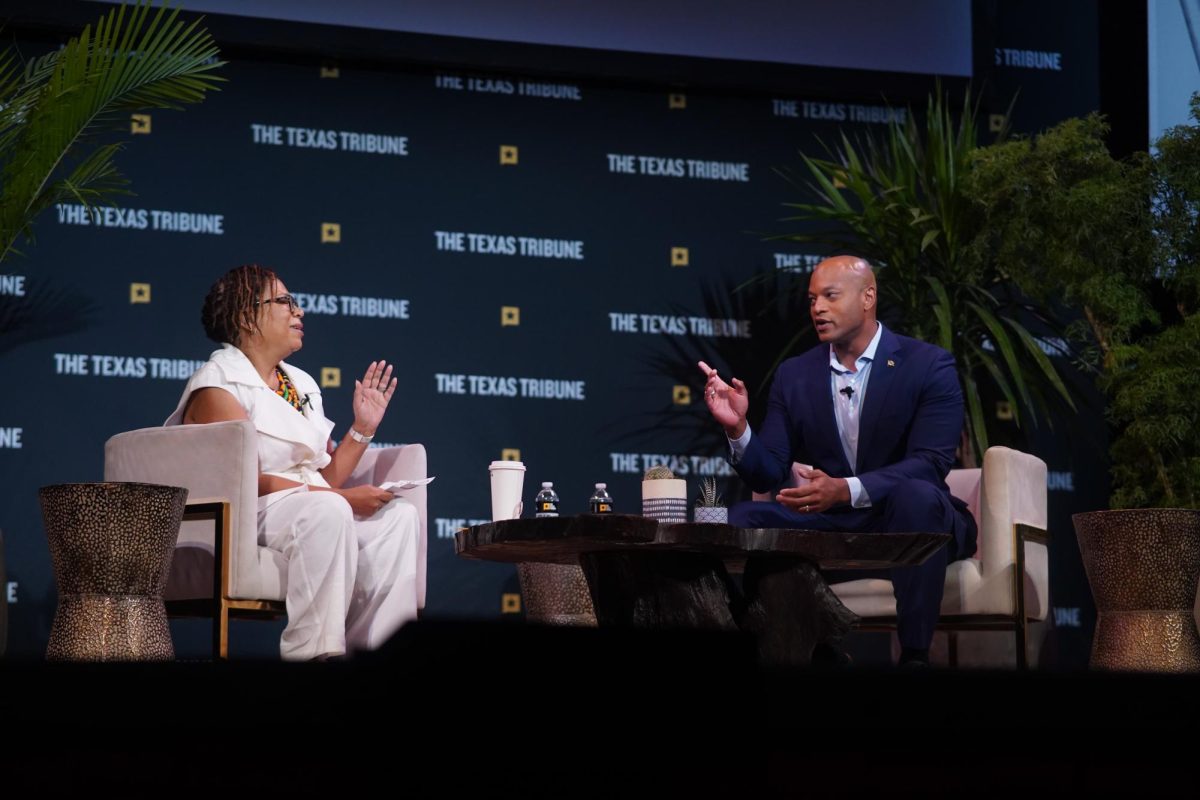
GOV. WES MOORE: Maryland Gov. Wes Moore took to the stage at Paramount Theater early Friday morning to have a conversation with NPR’s “Morning Edition” co-host Michel Martin. In 2022, Moore was elected as Maryland’s 63rd governor. Prior to becoming governor, Moore served in the United States Army for 16 years until 2016. On Friday, he spoke about his time of service as well as his past, stating that his life experience made him one of the most improbable governors in America. He said his improbable rise has empowered him to fight for the causes he believes in.
“I’m going to fight for people like my dad, I’m going to fight for people like my mom, I’m going to fight for people like my family members, who frankly in many cases are very distrusting of the system, and they’re justified in their distrust in this system,” he said. “I think it was that background, it was that foundation, that I think really helped to serve as not just my North Star but also the platform and the way that I want to work on the issues that I want to work on.”
When Moore was elected governor he made history for not only Maryland but for the nation.
“I became the first Black governor in the history of my state, and the third Black governor in the history of this country,” he said. “I would have conversations with my grandfather about how he’s the first Black minister in the history of the Dutch Fork Church, and he was always very, very clear to me; he said, “Making history is not the assignment; that’s not the point. What you do when you’re in the seat is. And how you use that time that you have left inside of that seat to be able to make an impact on the lives that you care about and the community that you love and support. That’s what actually matters.”
When asked about his message to presidential nominee Kamala Harris, he offered a similar message.
“Her making history is not the assignment, her shattering glass ceiling is not the assignment,” he said. “The reason that I’m excited to support her is not because on Inauguration Day she is going to do something that we have never seen before. It’s because she’s going to help us create, and we’re all going to work together to create the kind of country that we have never seen before.”
As Moore spoke, he focused on conveying the message to the audience of the importance of the big picture. He shared his rough road battling hate and people trying to diminish his efforts and the time he doesnt have for that “foolishness.” Looking at the big picture and what needs to be done is what Moore feels will create a successful state of Maryland and country as whole.
“We have no right to mourn the micro if we are not going to address the macro,” he said. “I just think that this is not about what we can do to get Republicans to do this or Democrats to do this. We’ve gotta get America to take this seriously. America to take racism seriously, America to take xenophobia seriously, America to take antisemitism seriously, America to take anti-Islam seriously, America to take poverty seriously. There is not a country in the world that would be able to keep up with America when America understands that America is for all of us and not just some.”
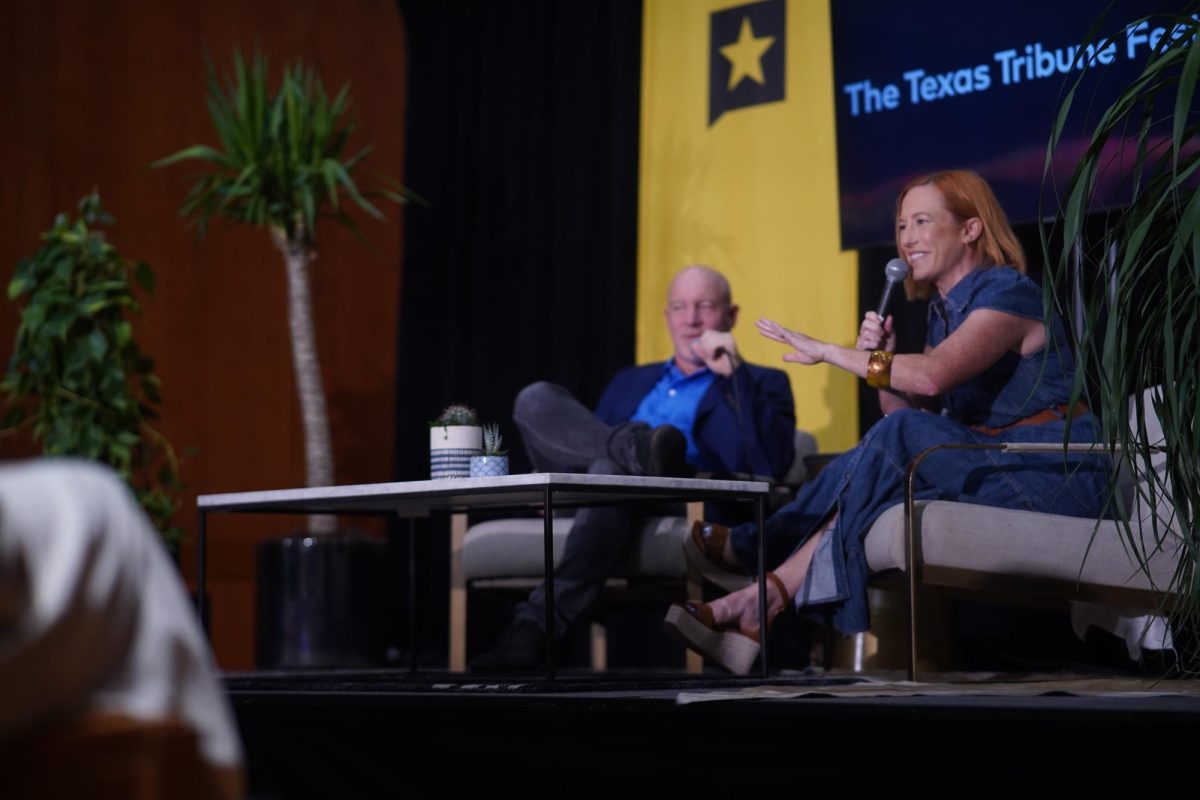
JEN PSAKI: On Friday afternoon at St. David’s Episcopal Church, former White House Press Secretary and current MSNBC host Jen Psaki discussed her new book “Say More” and the stakes of the 2024 election with Atlantic staff writer Mark Leibovich. The highly anticipated conversation drew in a large crowd, and many who stood outside of the room looked through the glass doors hoping to hear the conversation. With many topics covered, Psaki spent some time talking about her time working with President Biden and about her worrisome reaction to the June 27 presidential debate and the end of his political career.
“Watching [the Biden-Trump debate], my first reaction was not ‘Oh my gosh, Trump is going to win the election,’” she said. “That was not my reaction. I care about [Biden] as a human being, I do care about him a lot. It was like ‘Is he OK?’ honestly. I think anybody who spends time around him recognizes what a deeply good human being is. Yes, he’s done a lot as president, but he is a deeply grounded human being that you feel like maybe you’ve known for a long time. You spend a little bit of time with him, whatever your politics are, [and you come to realize] he is a person who is deeply good, and I was worried about him as a person, that was my initial reaction.”
In the time that progressed since that debate, Vice President Kamala Harris has been building momentum in the race. Previewing last Tuesday’s debate between Harris and Trump, Psaki explained that Harris has many different factors to consider in order to continue gaining ground in the presidential race.
“First it’s interesting, she and Trump have never met,” she said. “The balance for her is how do you push back when he is spewing lie-filled rants—which will happen—if he attacks you in a racist or sexist or creepy way, which certainly could happen. How do you respond in those moments and make him small while also remembering that this is probably one of the biggest audiences you are going to have before the November election. Everybody out there is not a progressive Democrat watching this debate, and you need to appeal to a broad audience of people who may be on the fence.”
Leibovich took the time to ask Psaki different scenarios that may happen after the election. Psaki told the crowd that what she’s seen behind the scenes may be benefiting the Harris movement, and if they do come out victorious, what she expects to see after Nov. 5.
“Here’s the thing that I will tell you about Washington,” she said. “People privately in hallways, many many many more Republicans than you think will say they hope he doesn’t win. They can move their party forward. Do I think that the Republican Party will reflect and change who they are? I hope so. I don’t think we’ve been given any indication that that’s where the party is headed. If Trump doesn’t win, it’s not over, MAGA’s not done.”
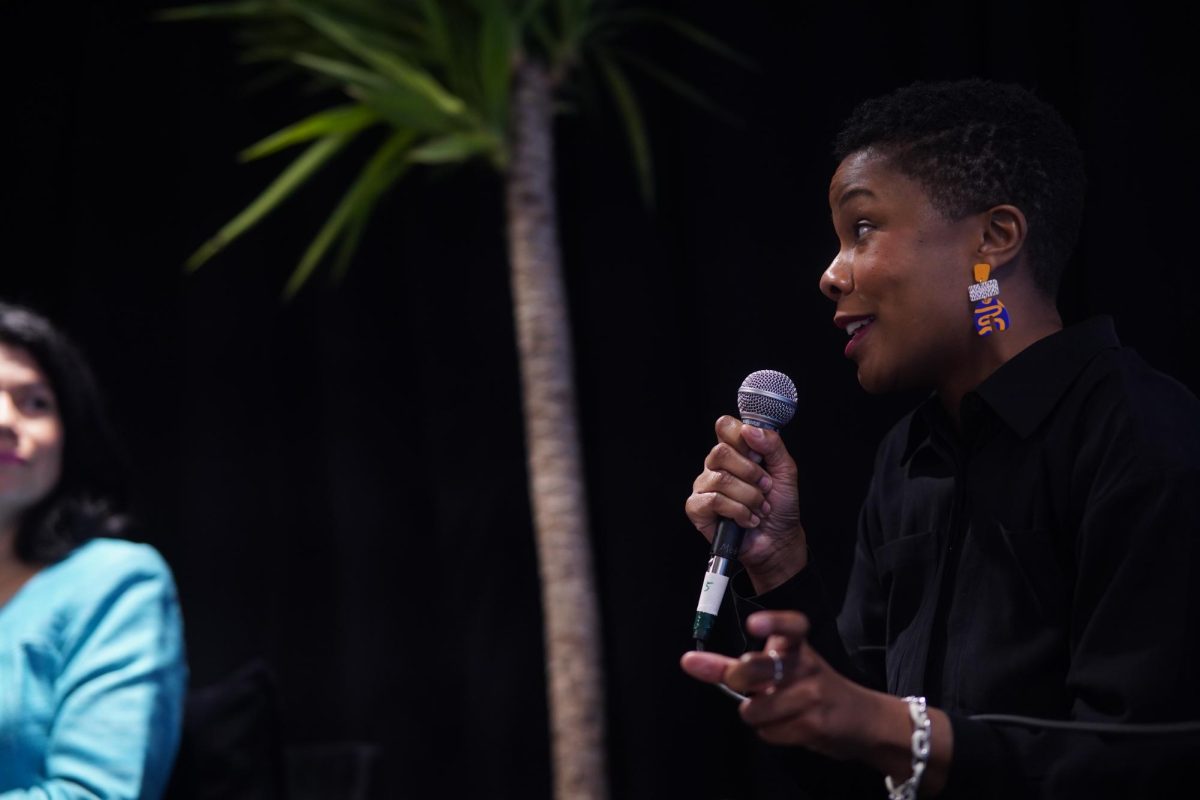
CARA ANTHONY: Four panelists, including KFF Health News Midwest correspondent Cara Anthony, participated in a midday Friday conversation about the solutions for solving racial disparities in healthcare access. The conversation was recorded for the podcast “What the Health.” Following the session, Anthony shared with MacJournalism how youth can get involved and stay educated about issues like health system disparities and the fight for equity in the healthcare system.
“Health literacy and health education starts young,” she said. “You’re never too young to care about your health and to care about the institutions that you go to. Don’t be afraid to start having those conversations and learning about the systems and learning about Medicare and Medicaid even now. It’s really really important.”
The session touched on many issues that young people will eventually have to face, but Anthony said that the younger generations should start understanding these healthcare challenges and what they can do to overcome them now.
“Make sure to give yourself some agency,” she said. “Even from a very young age to have those conversations with your doctor, it’s not just up to a guardian or the person that is taking you to receive the healthcare but come with your own questions: give yourself some power in all of this because you have to take care of you, so that’s the most important thing I think.”
Anthony shared that as she looks to the future ahead she invisions progress to the medical system that will create a more equitable system.
The future of healthcare is definitely super bright,” she said. “I’m hopeful. We’re up against a lot. I think that there is a future where health equity will be better. I’m really really hopeful that things are going to be better for all of us, for the next generation, for you and for the future.”
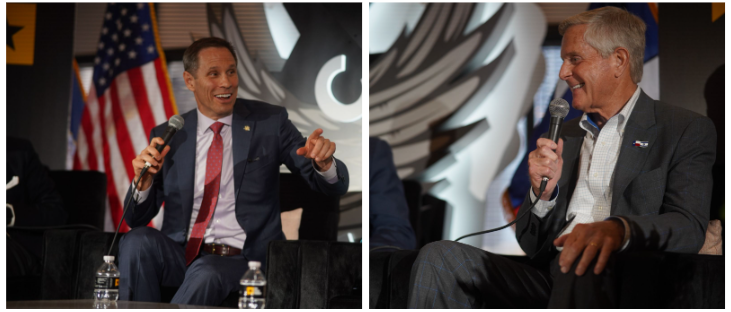
A LOOK AHEAD TO THE NEXT TEXAS SENATE SESSION: A heated discussion took place between four Texas state senators Friday afternoon in the Omni Hotel. Carol Alvarado, D-Houston; Nathan Johnson, D-Dallas; Phil King, R-Weatherford; and Kevin Sparks, R-Midland, turned a conversation into a debate as almost every single issue elicited conflicting views between the two parties. School choice and school funding was a hot topic that produced a wide range of answers.
Johnson strongly opposes school vouchers.
“You can look at [vouchers] as a policy issue and [as] a political issue, and I strongly disapprove of the way that issue is being handled in Texas on both fronts,” he said. “The Republican Party has controlled the building and therefore the education system for 30 years and the solution at the end of 30 years if we think our schools are failing is ‘I know what we’ll do. We’ll do nothing. We’ll privatize [schools]. We’ll sprinkle some competition fairy dust, and everyone will prosper.’ It’s a really enticing notion; people want to believe it. The machine has spent millions and millions and millions of dollars telling people that that’s the solution when in practice when you survey the nation, that’s not what we see.”
Johnson explained that he does not get the point of school vouchers. He stressed his belief that Texas students already have school choice due to the availability of magnet and charter schools as ways to switch schools within a public school district.
“There are a lot of things we could be doing to help our public education system,” he said. “If we just funded public education the way we did at the levels we set in 2019, we would be putting an extra $22 billion into the education system. You pump money into the system, it won’t fix everything, but it’s sort of like health insurance coverage. It doesn’t fix everything, but it’s prerequisite. Politically vouchers have become a proxy for power in this state, and I don’t think that’s the way it should be.”
Sen. King on the other hand offered a completely different point of view, immediately pointing out what he believes Johnson doesn’t understand.
“Let me help him understand where he’s a little misled on that,” he said. “I’ve been in the legislature for 26 years, and every year at one level or another school choice has been an issue. It’s never been more prominent than the last couple of sessions. But I’ll be honest I’ve got over 40 school districts in my senate district, and I’ll confess I came to school choice pretty slowly. I was a product of public schools, my wife was a product of public schools, I’ve got grandkids—a bunch of them—in public schools, and I’ve got some really well-performing school districts. I also have some that are not performing well.”
King said that those schools that are not performing at the level they should be are a prime reason for his current stance on vouchers.
“I’ve got one [school where on] the most recent STAAR test, only 35% of the kids in that school district are at grade level,” he said. “Even though we want to do whatever we can to improve and help public education, the districts that are poorly performing are not going to get fixed overnight, and they’re certainly not going to get fixed in time for the kids that are in them now to benefit from them.”
According to King, vouchers will increase competition, and make more education available to more students.
“School choice I think is good for competition and … is gonna give those parents or grandparents who are raising kids … an opportunity to do something that they don’t have right now,” he said. “Yes, I know you’re not going to have private schools pop up in tough areas and low income areas, but they’re gonna pop up faster than you think. They’re gonna pop up a whole lot faster than you think.”
The debate over school vouchers came to a close after the moderator, Texas Tribune political reporter James Berragan stopped Johnson before he could respond, saying they could argue about this topic forever but that the festival needed to move on to the next scheduled sessions.
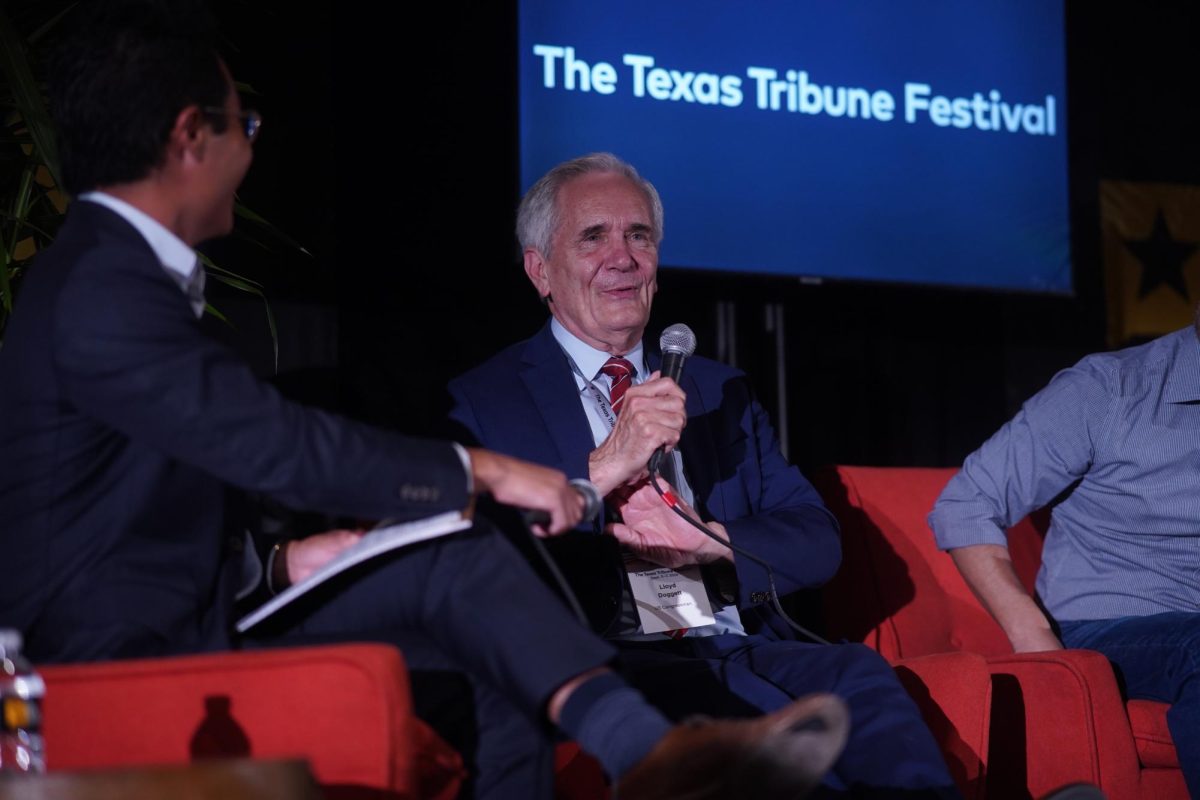
LLOYD DOGGETT: Three Democratic Congressmen from Texas took to the stage in St. David’s Episcopal church Friday afternoon. The session moderated by Texas Tribune Washington correspondent Matthew Choi included Joaquin Castro, D-San Antonio; Marc Veasey, D-Fort Worth; and Lloyd Doggett D-Austin.
Early on in the discussion, Choi asked Doggett about his choice to be the first Democratic in Congress to call for President Biden to step aside from running for a second term.
“This was not an easy decision,” he said. “I have a lot of respect for President Biden; he’s made a great contribution to our country. My wife Libby and I watched the debate together, and we were so troubled about what happened there. Instead of putting us on a trajectory of success after a year of being behind, we went just the other way. So the next morning, I was on the floor talking with every member that I could find, all of our leaders past and present, and I must say that while some veered neutral, no one disagreed with my comment that we needed to find another nominee.”
According to Doggett, Biden’s decision to back out of the race has revitalized the Democratic Party and infused the campaign with new enthusiasm since Vice President Kamala Harris has stepped up to run for president. Doggett said that the energy at the Democratic National Convention was vibrant and hopeful but also very familiar to him, so much so that it raises some worries.
“We’ve gone from despair and a path to defeat to one of joy and hope that we have a fighting chance,” he said. “I came away, Libby and I together, with great enthusiasm, spirit, a positive looking-forward campaign that is filled with joy. I will say with a bit of caution however; we were pretty enthusiastic in 2016, and Hillary had a bigger lead over Trump then than Kamala has now. We have a tough road ahead of us; she probably is still the underdog nationally, but it can be done if we all pitch in and do our part.”
The discussion pivoted away from the 2024 election to immigration. Doggett said that he feels that Texas and the nation has not done enough to support immigrants, and that the way the border is being handled, particularly in Texas, shuts down ideas like the American dream for many individuals.
“Our dreamers have been left hanging for years,” he said. “And all of the economic studies show that if we pass comprehensive immigration reform, and we include our dreamers, it would be an economic boom for our country. We’ve had a climate of hate and anti-immigrant hysteria that we’ve got to overcome. … I think the biggest barrier is finding any Republican who can feel they can join with us.”
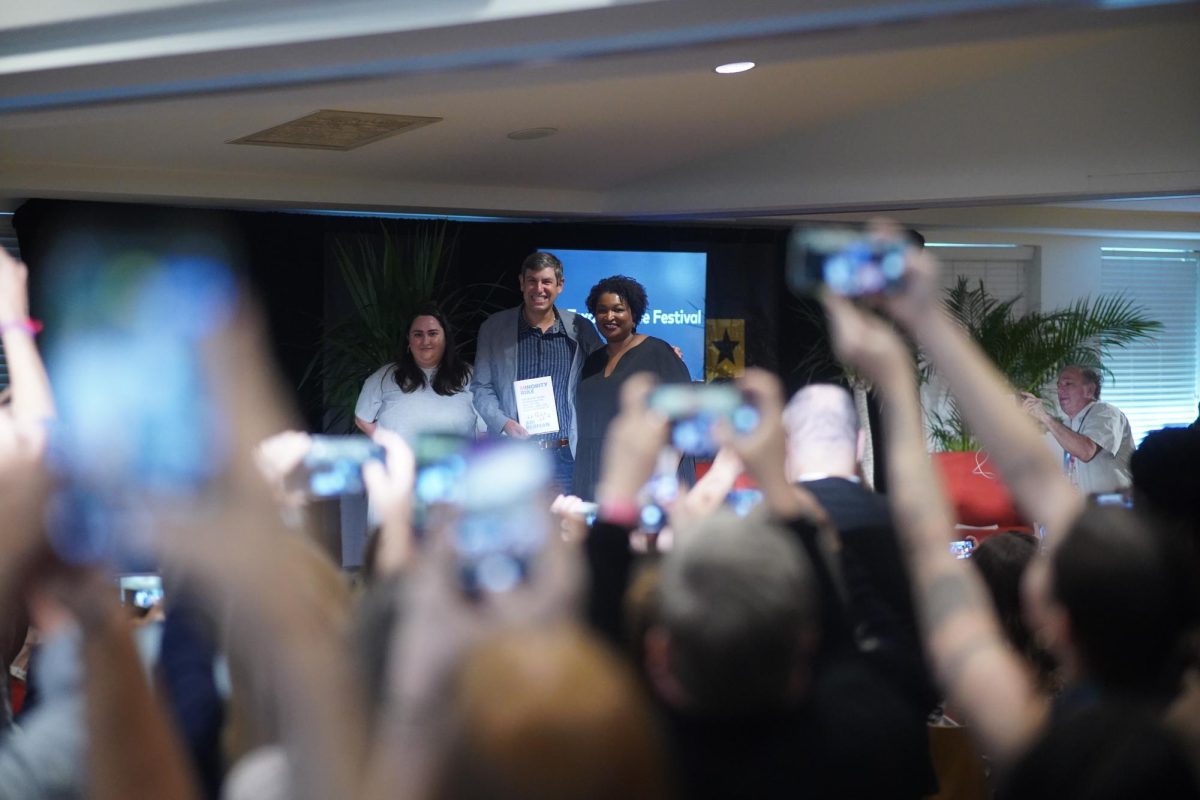
STACEY ABRAMS: During a Saturday morning session at St. David’s Episcopal Church, voting rights activist and two-time Democratic candidate for Georgia governor Stacey Abrams joined Mother Jones national voting rights correspondent Ari Berman and NPR political correspondent Ashley Lopez to discuss voting rights, threats to democracy and the will of the people.
Abrams quickly drew a majority of the attention from the crowd as people began to raise their phones to take a picture of her. Seeing this behavior, Abrams told the crowd she would go around section by section so everyone could take a picture. Abrams’ initial interaction with the crowd kicked off a session filled with conversations primarily focused around creating progress around voting rights.
“We’ve got to fix where we are, we’ve got to work where we are, and we’ve got to recognize that progress gets made where we are,” she said. “When I stood for governor in 2018, it took 248 years to get the nomination; we cannot let one moment or one setback set us back. But we also have to recognize that for us who live in places where our success is not only not guaranteed, it’s not expected, progress is victory, and we’ve got to aggravate that progress to get to victory.”
Abrams shared her personal experiences with seeing societal and political progress in America and how it connects with issues today.
“My parents grew up in Jim Crow Mississippi, and Dad got arrested at the age of 14 for registering Black people to vote,” she said. “He saw his daughter become the nominee for governor in his lifetime. Our responsibility is not to win, our responsibility is to work. Victory is a nice outcome, but our responsibility is to be in the fight, and that’s how we get this done.”
The conversation shifted the upcoming November election. Abrams talked about situations in the 2020 election that led to the attempt to overturn the results
“It didn’t work because we didn’t let it work,” she said. “It didn’t work because despite them storming the Capitol, we stormed the ballot boxes. We proved that our ability to determine our future was real and resonant and that’s why he got so mad. He had a temper tantrum because he lost, and if we can do it once we can do it again. Let’s get it done.”
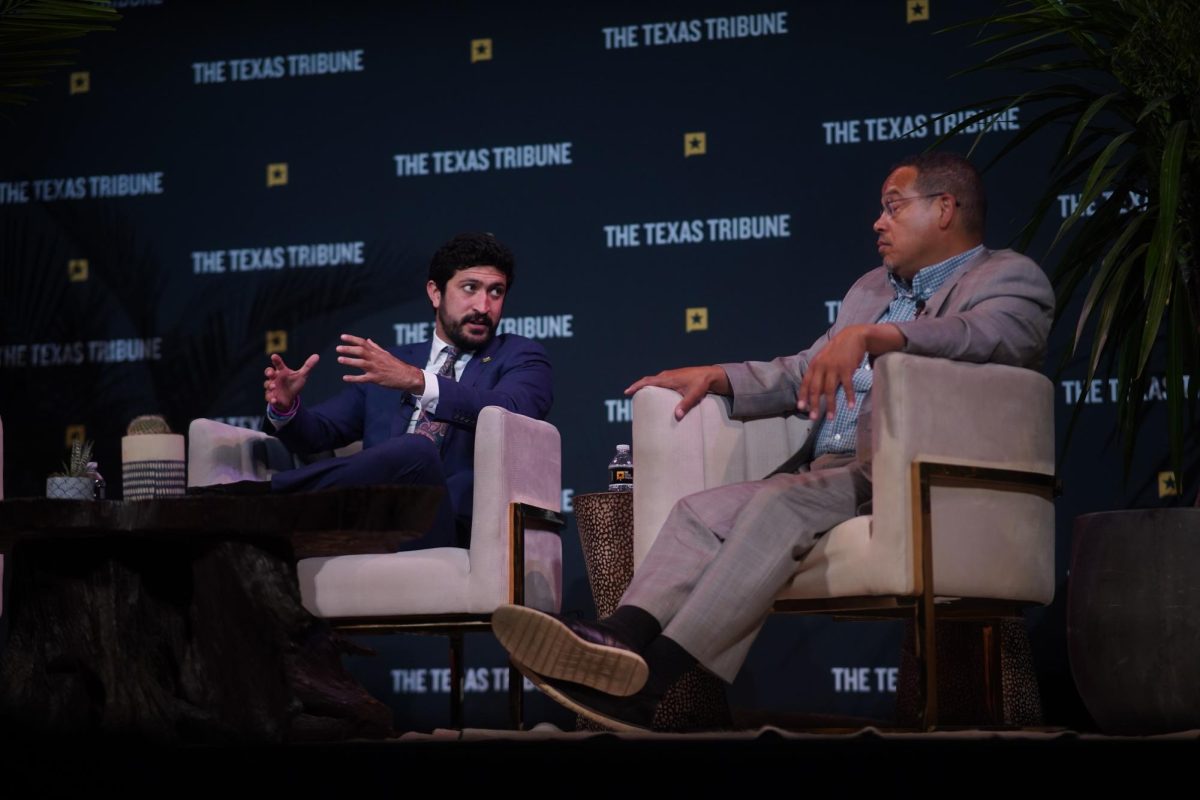
GREG CASAR: Native Austinite and U.S. Rep. Greg Casar, D-Austin, joined a panel Friday afternoon to discuss what it takes to achieve a progressive America. Minnesota attorney general Keith Ellison and MSNBC host Katie Phang joined Casar on the panel.
On Friday Sept. 6, Texas attorney general Ken Paxton filed a lawsuit to prevent Travis County from hiring an outside firm to find people eligible to vote who are not registered, an issue that became the primary focus of the session as it began. Casar, who represents Texas’s 35th congressional district, voiced his disapproval of Paxton’s actions.
”Ken Paxton, hard to call an attorney, around Keith or anybody else here in the audience, is suing our counties for basically telling unregistered voters, ‘Hey, you’ve got a right to vote; here’s how you can apply to make sure you’re a registered voter,’” he said. “It’s the most baseline American thing that we could do. You having to register to vote in this way already is a form of voter suppression.”
Throughout the session Casar localized many of the issues before the panel, using examples from the Austin area to back up his take on certain topics.
“It is so important for us to fully claim public safety as progressive,“ he said. “Here, the local Austin community finally went out and voted overwhelmingly to get rid of the secret police misconduct files, and a court just ruled that it’s gonna be opened up. That’s not just a police accountability progressive reform, it’s a public safety and good governance reform.”
In the last 15 minutes of the hour-long conversation, the panelists took questions from the crowd. One person said that they felt as though transgender Texans have been forgotten by progressive politicians.
Casar responded that progressives need to defend everyone.
“I think that as progressives our job is one to stand up for those basic rights and every single person, no matter who you are and including and especially trans folks and people that are targeted,” he said. “Why is Greg Abbott making it his thing to go and bully trans kids and take away their healthcare? It’s because he doesn’t want to talk about the fact that he’s defunding your public schools. He doesn’t want to answer questions about him not accepting our own tax dollars back here for the Medicaid program, which is killing people. His policies are killing people and rewarding his rich backers. We can’t walk away from anybody because when we walk away, the Republicans take more space.”
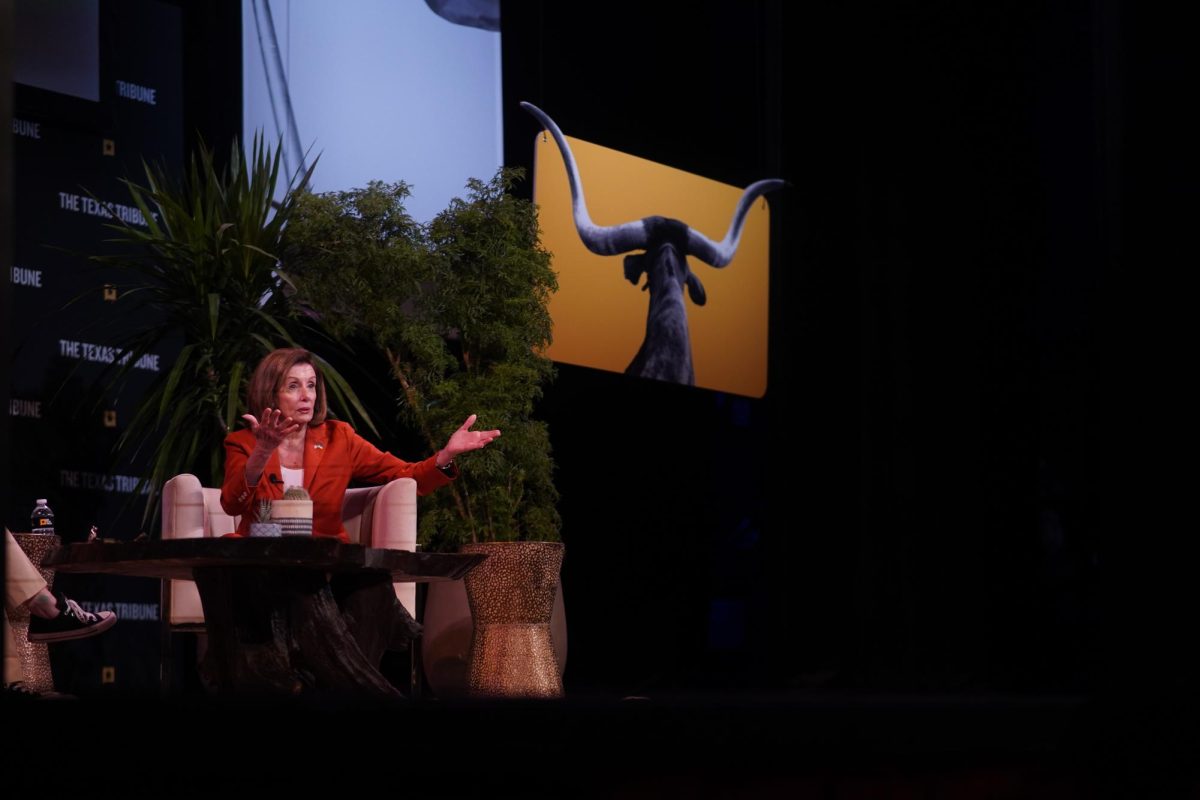
NANCY PELOSI: Former U.S. House Speaker Nancy Pelosi attracted a packed crowd Saturday afternoon at the Paramount Theater. Pelosi took the stage with New York Media editor at large Kara Swisher for the recording of the “On With Kara Swisher” podcast. Pelosi’s new book, The Art of Power, was a central topic of the session, in which she discussed many of the topics touched on in her book. Foremost among them was knowing your why.
“You have to know your why,” she said. “You have to know your vision. What is your purpose? What is your knowledge of the subject and therefore your judgment that people will respect? What is your strategy to get the job done? You must be ready. You must act.”
Later, the conversation shifted to the upcoming election. When asked what advice she has for Kamala Harris, she said that Harris should just be herself and build off of the foundation already put in place.
“Some people have said she should separate from Joe; no, she should spring from Joe,” she said. “This was remarkable what was done: the American rescue plan, the infrastructure plan, the CHIPS and science plan, the Inflation Reduction Act, the PACT Act for our veterans, the list goes on and on. You don’t walk away from that, but you say this enables us to do more because it’s values based; it’s visionary; it has a plan on how to get things done. What I would like to see in the debate is what I know is true, that this presidency of Kamala Harris will be one that takes us to new heights.”
Pelosi talked about the similarities between both her and Haris’s campaign, distinguishing themselves from their historic elections and hoping to direct people’s attention to their policies, which Pelosi says is what actually matters.
“Don’t vote for me because I’m a woman,” she said. “But don’t vote against me because I’m a woman. Hear what I have to say. It’s exactly what Kamala Harris is doing.”
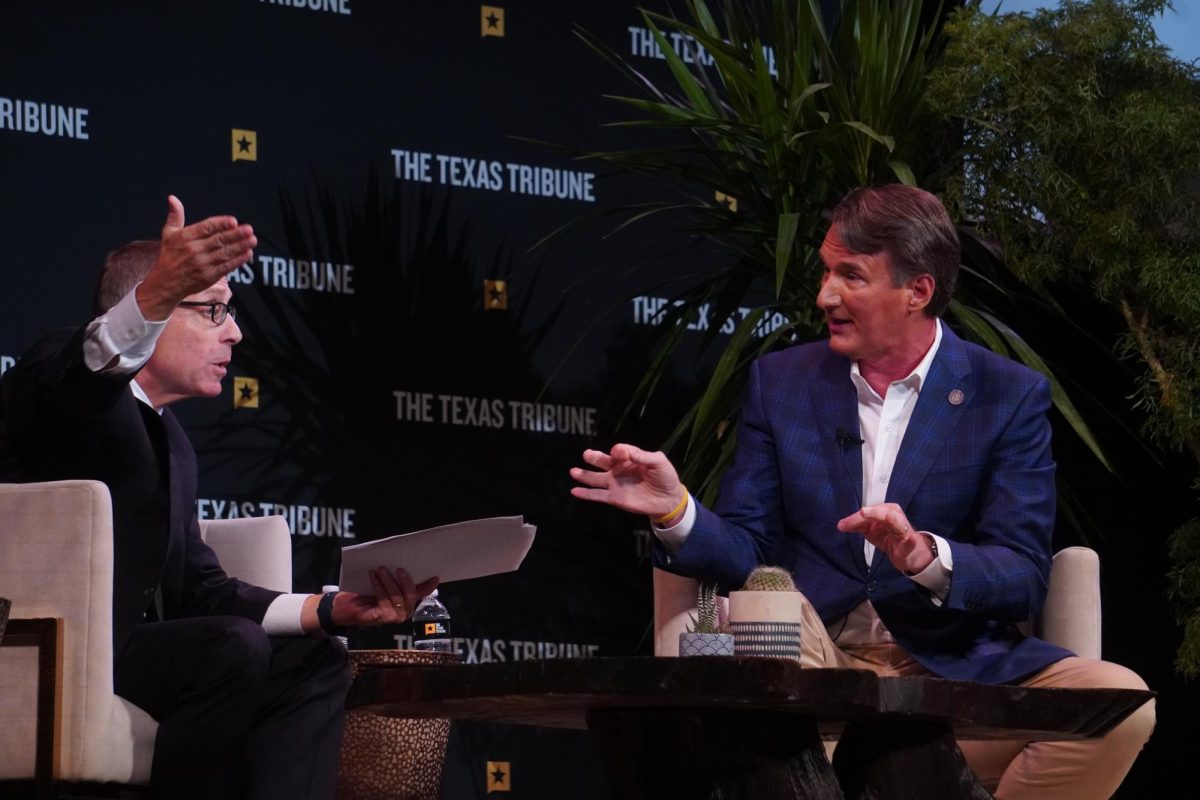
GLENN YOUNGKIN: On Saturday night, Virginia Gov. Glenn Youngkin closed out the Texas Tribune Festival in the Paramount Theater. Texas Tribune co-founder Evan Smith moderated the event as he did the opening keynote two nights before. Youngkin, a Republican, brought a starkly different perspective to the table than did Democratic keynote speaker, Michigan Gov. Gretchen Whitmer. Initially Youngkin talked about his path to becoming governor and established the core values he has brought with him as governor.
“I believe in lower taxes,” he said. “I believe in streamlined regulations, I believe in the power of free enterprise, I believe the parent should have a role at the table, and we should have high expectations for our kids, and most importantly I believe that if we have more police officers as opposed to less police officers so we can reduce crime, and the government should work for you. I firmly believe that we need a strong America in order to have a safe world.”
As the conversation continued, Smith eventually brought up the topic of book banning, one that Youngkin strongly supports.
“There are materials that were in the curriculum that really were inconsistent with a family’s personal values,” he said. “I firmly believe that parents should first have full transparency of what’s being taught in school. The idea of common sense being attributed to a family so they can make a decision about whether their child is reading a book that is consistent with their family values. It doesn’t fit with the progressive narrative, and so what they call that is ‘book banning.’”
Smith and Youngkin spent much of their session time on the issue, arguing back and forth about their opposing beliefs. Due to the more intense energy on stage, many times throughout the session, the crowd booed or yelled out against Youngkin, primarily during this discussion.
“What the progressive left wanted to do was change the narrative and said this is all about book banning,” he said. “It’s not about book banning, this is about empowering parents to have full transparency in what’s going on in their kids’ lives.”



